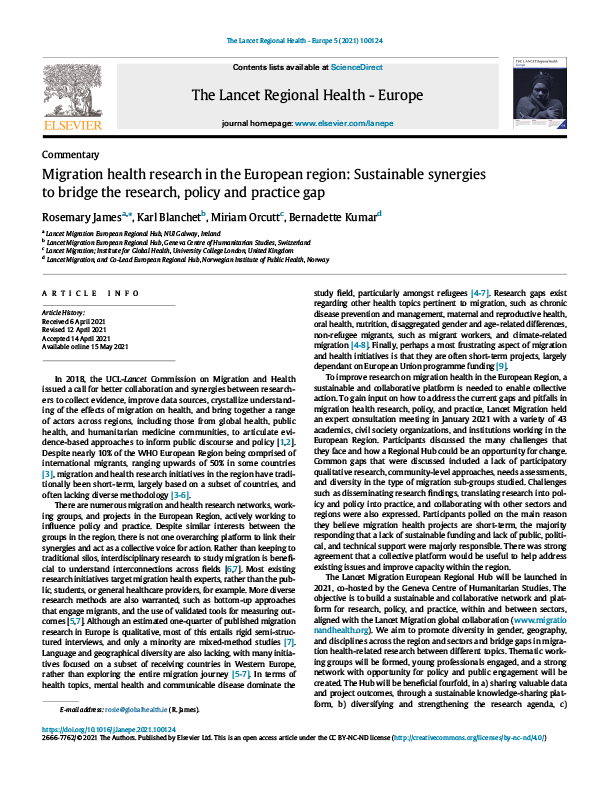In 2018, the UCL-Lancet Commission on Migration and Health issued a call for better collaboration and synergies between researchers to collect evidence, improve data sources, crystallize understanding of the effects of migration on health, and bring together a range of actors across regions, including those from global health, public health, and humanitarian medicine communities, to articulate evidence-based approaches to inform public discourse and policy. Despite nearly 10% of the WHO European Region being comprised of international migrants, ranging upwards of 50% in some countries, migration and health research initiatives in the region have traditionally been short-term, largely based on a subset of countries, and often lacking diverse methodology.
There are numerous migration and health research networks, working groups, and projects in the European Region, actively working to influence policy and practice. Despite similar interests between the groups in the region, there is not one overarching platform to link their synergies and act as a collective voice for action. Rather than keeping to traditional silos, interdisciplinary research to study migration is beneficial to understand interconnections across fields.
Most existing research initiatives target migration health experts, rather than the public, students, or general healthcare providers, for example. More diverse research methods are also warranted, such as bottom-up approaches that engage migrants, and the use of validated tools for measuring outcomes.
Although an estimated one-quarter of published migration research in Europe is qualitative, most of this entails rigid semi-structured interviews, and only a minority are mixed-method studies.
Language and geographical diversity are also lacking, with many initiatives focused on a subset of receiving countries in Western Europe, rather than exploring the entire migration journey. In terms of health topics, mental health and communicable disease dominate the study field, particularly amongst refugees.
Research gaps exist regarding other health topics pertinent to migration, such as chronic disease prevention and management, maternal and reproductive health, oral health, nutrition, disaggregated gender and age-related differences, non-refugee migrants, such as migrant workers, and climate-related migration. Finally, perhaps a most frustrating aspect of migration and health initiatives is that they are often short-term projects, largely dependant on European Union programme funding.
To improve research on migration health in the European Region, a sustainable and collaborative platform is needed to enable collective action. To gain input on how to address the current gaps and pitfalls in migration health research, policy, and practice, Lancet Migration held an expert consultation meeting in January 2021 with a variety of 43 academics, civil society organizations, and institutions working in the European Region. Participants discussed the many challenges that they face and how a Regional Hub could be an opportunity for change. Common gaps that were discussed included a lack of participatory qualitative research, community-level approaches, needs assessments, and diversity in the type of migration sub-groups studied. Challenges such as disseminating research findings, translating research into policy and policy into practice, and collaborating with other sectors and regions were also expressed. Participants polled on the main reason they believe migration health projects are short-term, the majority responding that a lack of sustainable funding and lack of public, political, and technical support were majorly responsible. There was strong agreement that a collective platform would be useful to help address existing issues and improve capacity within the region.
The Lancet Migration European Regional Hub will be launched in 2021, co-hosted by the Geneva Centre of Humanitarian Studies. The objective is to build a sustainable and collaborative network and platform for research, policy, and practice, within and between sectors, aligned with the Lancet Migration global collaboration (www.migrationandhealth.org). We aim to promote diversity in gender, geography, and disciplines across the region and sectors and bridge gaps in migration health-related research between different topics. Thematic working groups will be formed, young professionals engaged, and a strong network with opportunity for policy and public engagement will be created. The Hub will be beneficial fourfold, in:
- sharing valuable data and project outcomes, through a sustainable knowledge-sharing platform,
- diversifying and strengthening the research agenda,
- identifying evidence-based best practices, and
- promoting collaboration across sectors and regions.
We envision an active and collaborative Hub that is both inclusive and sustainable, to ultimately advance the migration and health research agenda in the European Region.
The original paper is available for free download from The Lancet’s own website.



